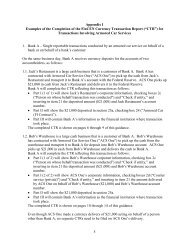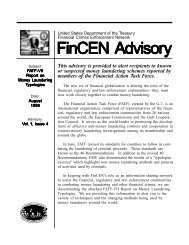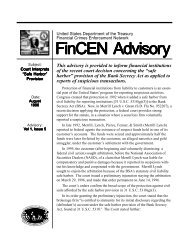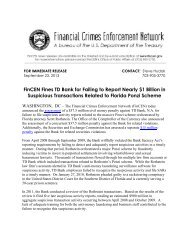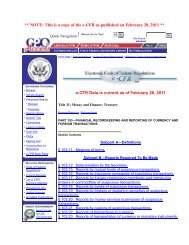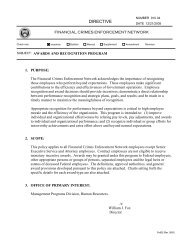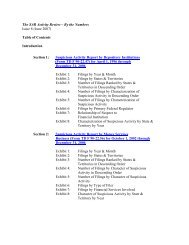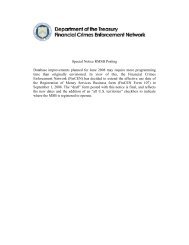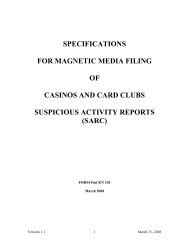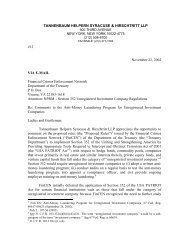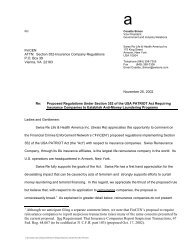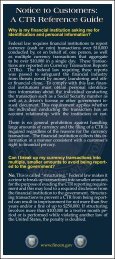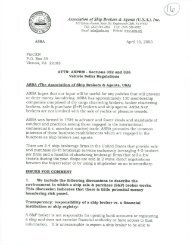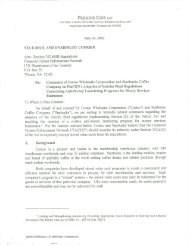The SAR Activity Review Issue 12 - FinCEN
The SAR Activity Review Issue 12 - FinCEN
The SAR Activity Review Issue 12 - FinCEN
Create successful ePaper yourself
Turn your PDF publications into a flip-book with our unique Google optimized e-Paper software.
largely oriented towards various ethnic communities within the United States that<br />
are sending money to friends, businesses, and family members back in their home<br />
countries. <strong>The</strong>se ethnic orientations permeate the entire money transmission<br />
business and result in customers, employees, officers, and owners being largely<br />
from the ethnic community served by the particular money transmitter. English is<br />
either a second language or not spoken at all in most circumstances. This does not<br />
stop the state-licensed money transmitter’s <strong>SAR</strong> compliance. But the language<br />
barrier can make the compliance more difficult to achieve since translation can<br />
become a cost and a burden. Cultural issues are also a concern. Many of these<br />
ethnic communities are from cultures that instill a fear of government and third<br />
parties being involved in personal finances and families. This fear and mistrust<br />
can create misperceptions and misunderstandings. <strong>The</strong> ethnic oriented money<br />
transmitters are faced with a particularly difficult task of discerning between<br />
normal fear and mistrust and customers or other persons with more nefarious<br />
purposes or intents. One way of alleviating some of this problem would be to<br />
conduct community outreach in the specific languages involved and to provide <strong>SAR</strong><br />
forms and compliance materials in the specific languages as well.<br />
This brings up the issue of defensive <strong>SAR</strong> filings. Out of fear of punishment for<br />
failing to file an <strong>SAR</strong> when required, some have come to believe that it is better to<br />
err on the side of caution and file an <strong>SAR</strong> in much less clear circumstances than<br />
others. This deters the law enforcement value of <strong>SAR</strong>s in general as it will result<br />
in many filings where there is no actual illegal activity even though an <strong>SAR</strong> may<br />
be called for because there is some aspect of the transaction creating suspicion<br />
and causing the need for a filing. Money transmitters know and take pride in<br />
knowing they are assisting law enforcement when filing <strong>SAR</strong>s. A redesigned<br />
form could possibly allow the money transmitter to rate the transaction as to the<br />
level of suspiciousness. This would hopefully assist law enforcement in allocating<br />
resources appropriately.<br />
For several years now, money transmitters have faced significant difficulties<br />
finding, obtaining, and keeping bank accounts that are necessary to keep their<br />
businesses efficient, profitable, and transparent. This problem affects all<br />
money transmitters, both large and small. Most in the industry have come to<br />
believe that the reason for the difficulties with bank relationships arise from a<br />
misperception that all money transmitters represent an unacceptable compliance<br />
risk for the bank.<br />
This misperception is an unfair and unjust overgeneralization that fails to take<br />
into account the particular money transmitter involved. <strong>The</strong> most significant<br />
attribute that will distinguish a high risk money transmitter from a low risk<br />
money transmitter is whether the particular money transmitter in question is<br />
licensed by the state regulatory authorities where that money transmitter is<br />
engaged in business.<br />
1



